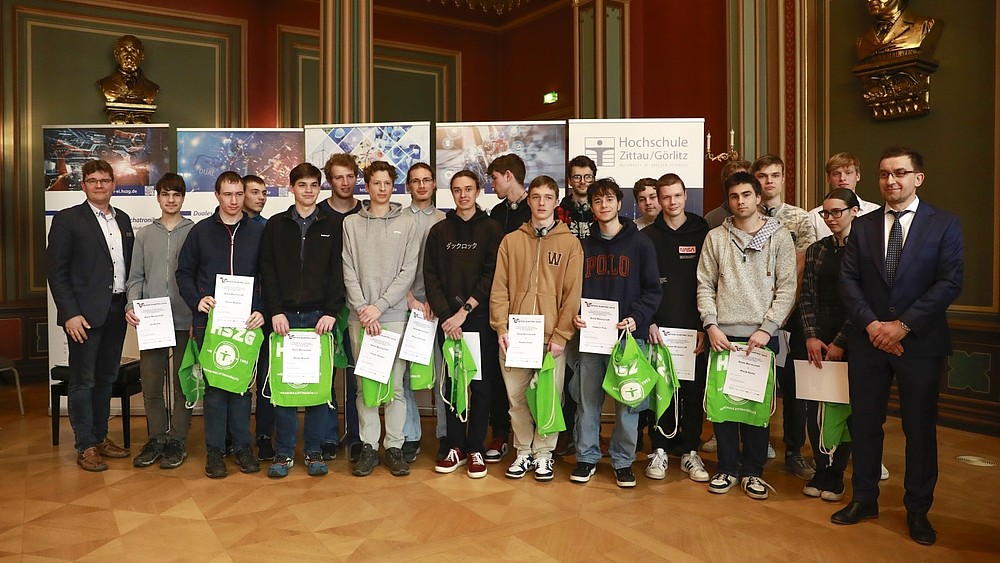The 30th edition of the International Electrical Engineering Olympiad took place on Saturday. The winner comes from the Czech Republic.

On Saturday, the Neisse-Elektro electrical engineering Olympics took place for the 30th time. Once again this year, 20 pupils from Poland, the Czech Republic and Germany were invited to take part in the STEM competition.
After the students had completed a 90-minute exam in the morning at the level of a first semester exam, the respective national winners, the best national team and the ten best participants were then chosen. The group victory clearly went to the Czech team from a school in Liberec. In total, eight of the ten best-placed teams came from this school. Seventh place went to a student from Luban in Poland, while Alexander Führer, a student from the vocational school center in Zittau, took tenth place.
The award ceremony as part of the "Neisse-Elektro 2024" took place as usual in the afternoon in the citizens' hall of Zittau town hall. Prime Minister Michael Kretschmer also took part in the award ceremony. After being welcomed by the Mayor of Zittau, Thomas Zenker, the Minister President gave a welcome address. Other speakers included the Marshal of the Lower Silesian Voivodeship, Cezary Przybylski, and the Captain of the Liberec district, Martin Půta.
The award ceremony was held by Prof. Dr.-Ing. Cezary Dzienis from the Faculty of Electrical Engineering and Computer Science at Zittau/Görlitz University of Applied Sciences. In addition to a certificate, the winners were delighted to receive selected, sponsored prizes from the field of technology.

The Neisse-Elektro Olympiade was launched in 1995 by Prof. Bernd Herzig and Dr. Wolfgang Menzel and has since developed into an important cross-border educational project in the field of electrical engineering. Behind the Neisse-Elektro is a dedicated working group from the Zittau/Görlitz University of Applied Sciences, which organizes the competition together with teachers from Germany, Poland and the Czech Republic, from regional schools, vocational schools and grammar schools.
Last year, Prof. Dzienis from Poland took over the leadership of the working group. In addition, the Czech HSZG laboratory engineer Ondrej Svarc joined the working group. As a result, the HSZG-Neisse-Elektro team now consists of three languages.
The Olympiad attracts international participants from Poland and the Czech Republic every year. The furthest away, however, was a student who took part from New York. A teacher from the team had transferred to the school abroad Registration takes place online and usually in coordination with the physics teachers at the schools in the Neisse Euroregion.
Over the last 30 years, more than 1,300 pupils have taken part in Neisse-Elektro. Participants are prepared through workshops at the university, additional courses at schools and in-depth lessons. In some cases, training camps with overnight stays in youth hostels, courses, excursions and leisure activities have even been offered.
The Saxon State Ministry of Science has been the patron of the event for many years.
The Olympiad always takes place on a Saturday The day begins at 10 a.m. with a 90-minute exam, followed by lunch. After an exciting intermediate program for the students, the award ceremony takes place at 3 pm in the festive Bürgersaal of the town hall in Zittau. The exam includes tasks at the level of the first semester of an electrical engineering course, including topics such as resistances, current, voltage, capacitors, coils, transformers, magnetic field and electric field.
The award ceremony will be held with a ranking for the "Best National Team", followed by the three best participants from each country, then places 4-10 and finally places 1-3.
All information about Neisse-Elektro can be found here!
The University of Applied Sciences Zittau/Görlitz congratulates the best placed and all participants. The best team comes from the Czech Republic.